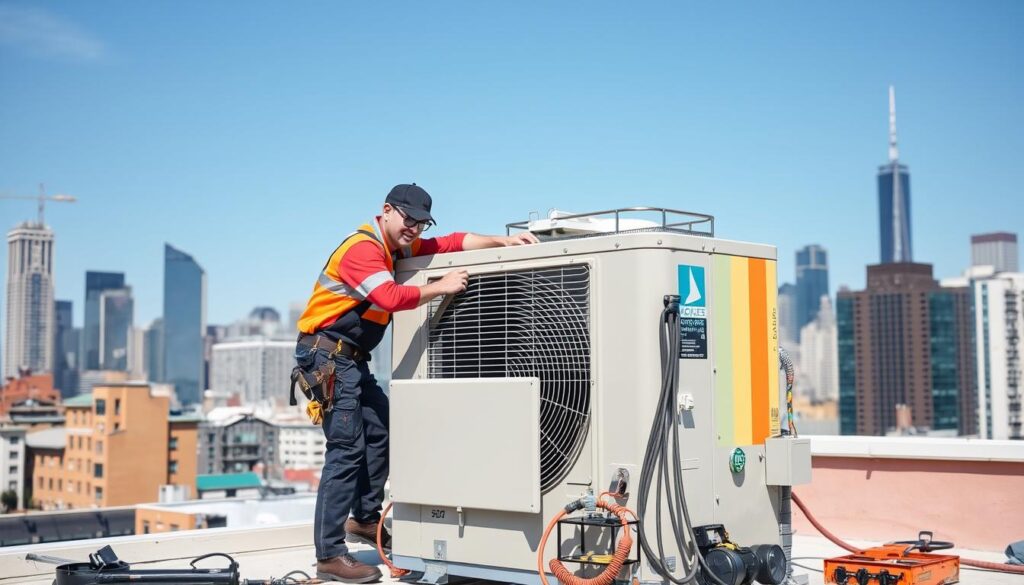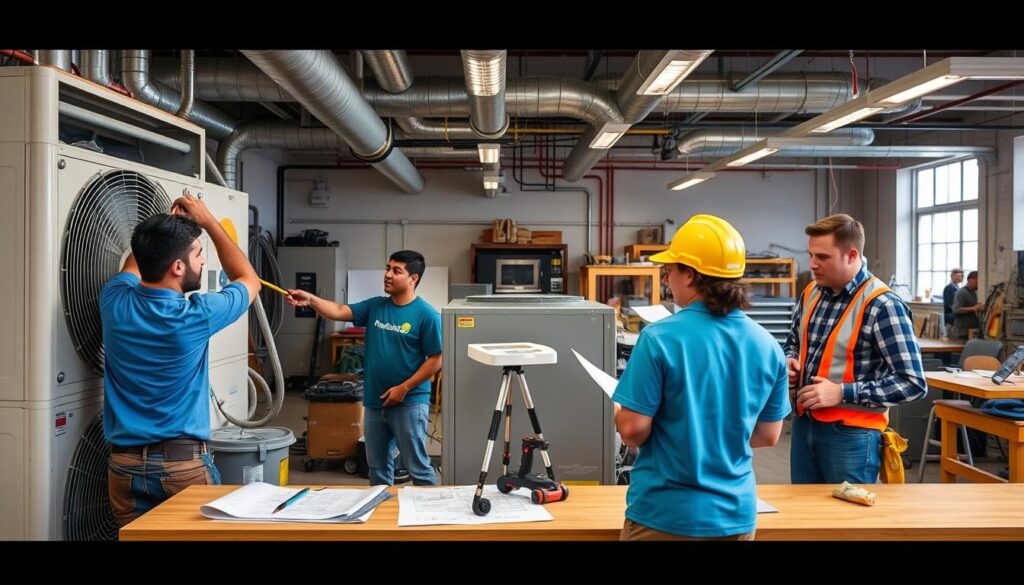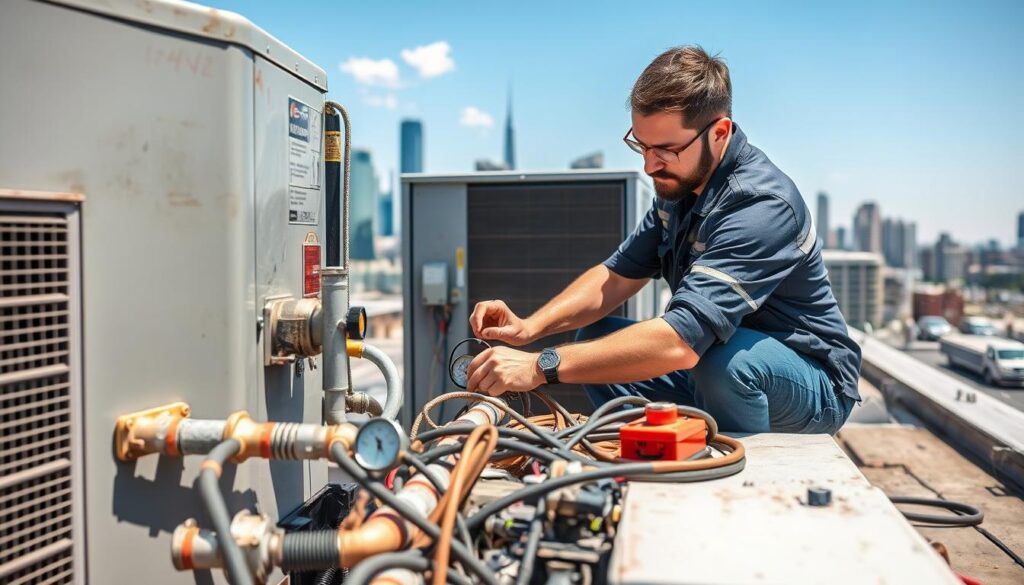Affiliate Disclosure
HVAC Guide Guys is a participant in the Amazon Services LLC Associates Program, an affiliate advertising program designed to provide a means for sites to earn advertising fees by advertising and linking to Amazon.
Can You Do HVAC Without High School Diploma? It might surprise you, but you don’t need a high school diploma to start a rewarding career as an HVAC technician. The HVAC field has different paths for those who didn’t follow the usual school route.

In Texas, a high school diploma or GED is usually needed to become an HVAC tech. But, there are other ways to get into this field. These options can lead to good jobs and pay for those looking to join the HVAC industry.
Key Takeaways
- The HVAC industry offers diverse career opportunities for individuals without a high school diploma or GED.
- Alternative education paths, such as trade schools and vocational training programs, provide the necessary technical skills and certifications to become an HVAC technician.
- Continuing education and industry-specific certifications are crucial for career advancement and staying up-to-date with industry trends.
- Financial aid options, including scholarships and grants, can support non-traditional students in pursuing HVAC education and training.
- On-the-job training and state licensing requirements are important considerations for building a successful HVAC career without a traditional academic background.
Table of Contents
Understanding HVAC Career Paths Without Traditional Education
Exploring HVAC career paths doesn’t always need a high school diploma. There are other ways to start a rewarding HVAC career. Knowing these options helps aspiring HVAC technicians make smart choices for their future.
Traditional vs Alternative Routes to HVAC
Traditionally, HVAC training needs a high school diploma or GED. These programs last 6 months to 2 years. They teach technical skills like diagnosing problems and using equipment.
But, there are also alternative paths. Apprenticeships mix classroom learning with hands-on training. They last 3 to 5 years and offer a stipend, giving a real-world learning experience.
Basic Requirements for Entry-Level Positions
For entry-level HVAC jobs, you need a knack for mechanical and electrical work. Employers often look for people who are eager to learn, even without a high school diploma.
Industry Overview and Opportunities
The HVAC industry is growing fast, with a 15% job increase expected by 2026. This growth means lots of chances for those wanting to join the HVAC field, even without traditional education.
| HVAC Career Paths | Entry-Level Requirements | Industry Opportunities |
|---|---|---|
| Apprenticeship programs | No high school diploma required | On-the-job training, potential stipend |
| HVAC certificate programs | High school diploma or GED preferred | Technical skills, job placement assistance |
| HVAC associate’s or bachelor’s degree | High school diploma or GED required | Expanded service offerings, potential business ownership |
By learning about HVAC career paths, entry-level requirements, and industry opportunities, those without traditional education can find good ways to start in HVAC.
Explore Our HVAC Shop
Looking for top-rated HVAC tools, parts, and accessories? Visit our shop and find the perfect solution for your needs.
Visit the ShopCan You Do HVAC Without High School Diploma
Many people choose HVAC (Heating, Ventilation, and Air Conditioning) as a career. Some employers want a high school diploma or GED. But, others care more about your skills and experience.
The HVAC field is growing fast, with a 15% increase in jobs by 2026. You don’t need a diploma to start. A GED or other skills can show you’re ready.
HVAC programs last about nine months and teach you a lot. Apprenticeships last three to five years and give you real-world experience. These options are great if you don’t have a diploma.
Getting a NATE (North American Technician Excellence) Certification is key. It shows you know your stuff in HVACR systems. With the right training and experience, you can succeed in HVAC without a diploma.
| Certification | Description | Average Salary |
|---|---|---|
| NATE Certification | Demonstrates competency in HVACR systems | $50,590 annually |
| EPA Certification | Required for handling refrigerants | $50,270 annually (in Ohio) |
| Journeyman License | Allows for independent HVAC work | Varies by state |
| Master HVAC Technician License | Highest level of HVAC certification | Varies by state |
While a diploma is nice, it’s not always needed. Focus on your technical skills, get certifications, and gain experience. This way, you can have a great HVAC career without a traditional education.
Explore Our HVAC Shop
Looking for top-rated HVAC tools, parts, and accessories? Visit our shop and find the perfect solution for your needs.
Visit the ShopTrade Schools That Accept Students Without Diplomas
If you’re looking into a career in the HVAC field but don’t have a high school diploma, there’s hope. Many trade schools and community colleges welcome students without traditional credentials. They offer specialized vocational programs that focus on hands-on training and the skills needed for HVAC success.
Community College Options
Community colleges across the U.S. are making HVAC education more accessible. For example, Front Range Community College in Colorado offers HVAC and Refrigeration programs. Southern Technical College in Florida trains in medical assisting and welding. The Community College of Baltimore County in Maryland also accepts students without a high school diploma or GED for various programs.
Vocational Training Programs
There are many trade schools and vocational programs for students without traditional education. These programs focus on practical learning experiences for HVAC careers. Central Community College in Nebraska and St. Charles Community College in Missouri are examples, offering programs in automotive technology, dental assisting, medical billing, and medical assisting.
Admission Requirements and Processes
The admission requirements for these schools vary. Some may ask for proficiency exams, personal statements, or letters of recommendation. Others might use the Ability to Benefit law for financial aid eligibility. It’s crucial to check the specific requirements of the schools you’re interested in for a smooth application process.
| School | Program | Graduation Rate | Average Financial Aid |
|---|---|---|---|
| Front Range Community College | HVAC and Refrigeration | 57% | $10,087 |
| Southern Technical College | Medical Assisting, Welding | 18% | $6,882 |
| Community College of Baltimore County | Contact Tracing, Manufacturing | 22% | $4,224 |
| Central Community College | Automotive Technology, Dental Assisting | 35% | $7,531 |
| St. Charles Community College | Medical Billing, Medical Assisting | 45% | $8,193 |
Alternative Education Requirements for HVAC Training
If you want to be an HVAC technician but didn’t finish high school, don’t worry. Many HVAC training programs have special paths for you. They help students who didn’t follow the usual school route.
To join these programs, you might need to show your skills and knowledge. This could be through a hands-on test, a written exam, or both. It’s to make sure you’re ready for the HVAC training ahead.
Some programs let you take a GED course while you learn HVAC. This way, you can get your high school diploma while learning a valuable skill. It’s a great way to get ahead in the HVAC field.
Work experience in related fields like construction or electrical work can also count. Schools know that real-world experience is just as important as school grades. It shows you’re ready to work hard and learn fast.
By taking these alternative paths, you can start a fulfilling HVAC career. It doesn’t matter if you didn’t go to school the usual way. What matters is your dedication and ability to succeed in this exciting field.
| HVAC Technician Salary | Job Outlook | Training Duration |
|---|---|---|
| Median annual salary of $50,590 as of May 2020, with the top 10% earning more than $80,820 per year. | 5% job growth projected between 2020 and 2030, translating to more than 38,500 additional jobs. | HVAC technicians can earn a certificate in as few as 9-10 months, an associate degree in up to two years, and apprenticeships can last 2-5 years. |
Explore Our HVAC Shop
Looking for top-rated HVAC tools, parts, and accessories? Visit our shop and find the perfect solution for your needs.
Visit the ShopFinancial Aid Options for Non-Traditional Students
Starting an HVAC career without a high school diploma can be tough financially. But, there are ways to get help. The Ability to Benefit law lets students without traditional diplomas get some financial aid. This includes federal grants and student loans.
Understanding the Ability to Benefit Law
The Ability to Benefit (ATB) law helps students without a high school diploma or GED. They can show they’re ready for college by passing a test or completing 6 college credits. This opens the door to financial aid, making HVAC training easier for non-traditional learners.
Available Scholarships and Grants
- Many scholarships and grants help non-traditional students, including HVAC students.
- The HVAC Excellence Scholarship Program and the Refrigeration Service Engineers Society (RSES) offer scholarships for HVAC students.
- Community colleges and technical schools have grants and aid packages for non-traditional students.
Payment Plan Options
Many HVAC training providers offer flexible payment plans. These plans include monthly payments, deferred payments, or tuition reimbursement from employers. These options help non-traditional students manage the cost of HVAC training.
| Institution | Tuition and Fees | Students Receiving Aid | Average Aid Amount | Graduation Rate |
|---|---|---|---|---|
| University of California | $44,467 | 55% | $21,669 | N/A |
| Southern Technical College | $18,500 | 85% | $4,105 | 57% |
| Columbia-Green Community College | $11,160 | 70% | $8,791 | 35% |
| Community College of Baltimore County | $10,880 | 65% | $5,987 | 18% |
| St. Charles Community College | $5,664 | 75% | $10,087 | 23% |
| University of Hawaii Community Colleges | $3,284 | 100% | $3,852 | 16% |
| Wayne County Community College District | $4,067 | 85% | $7,094 | 14% |
| Union County College | $9,500 | N/A | N/A | N/A |
The cost of HVAC training varies a lot. It can be from $1,500 to $30,000 or more. Community colleges usually have lower tuition rates for HVAC programs. With the right financial aid, non-traditional students can start their HVAC careers.
Explore Our HVAC Shop
Looking for top-rated HVAC tools, parts, and accessories? Visit our shop and find the perfect solution for your needs.
Visit the ShopOn-the-Job Training Opportunities
Want to become an HVAC technician without a high school diploma? On-the-job training is a great option. Many HVAC companies offer hands-on training programs. These programs let entry-level employees learn by doing.
These training chances are often apprenticeships or internships. You work with skilled HVAC pros. Apprenticeships last from one to six years, giving you deep, practical knowledge.
The Apprenticeship State Expansion (ASE) program is funded by a $4.5 million federal grant. It supports on-the-job training. After finishing, you get a “Certificate of Completion” from the Department of Labor.
Apprentices also get classroom training, usually in the evenings. This can be at trade schools, community colleges, or online. Some programs even let you earn an associate degree while getting your Certificate.
On-the-job training in HVAC is a chance to learn by doing. It combines practical experience with classroom learning. This way, you can get the skills and credentials for a rewarding HVAC career.

State Licensing Requirements and Considerations
Starting your HVAC technician career means knowing your state’s licensing rules. Licensing laws for HVAC vary across the U.S. It’s key to check the specific rules in your area. Some states need a high school diploma or GED for a license. Others have different ways to get certified, even without a diploma.
Certification Pathways
Don’t worry if you didn’t finish high school. There are ways to get HVAC certifications. Many states have special programs for those without a diploma. These programs use hands-on training, apprenticeships, or vocational classes. They help you get the needed credentials to work as an HVAC tech.
Required Documentation
- Proof of HVAC-related work experience or training
- Passing scores on state-approved HVAC certification exams
- Proof of liability insurance and bonding, as required by your state
- Completed license application and payment of associated fees
Knowing what documents you need for HVAC licensing is important. Make sure to research the specific requirements. Prepare all needed paperwork to make the licensing process easier.
“Obtaining the proper HVAC licensing is a critical step in building a successful career in the industry, regardless of your educational background.”
Explore Our HVAC Shop
Looking for top-rated HVAC tools, parts, and accessories? Visit our shop and find the perfect solution for your needs.
Visit the ShopBuilding Your HVAC Career Without Traditional Credentials
Starting a career in HVAC doesn’t need a traditional education. The field offers many career development chances for those without a high school diploma or formal training. By focusing on skill building and professional growth, you can succeed in HVAC and beat traditional education barriers.
The HVAC industry has many on-the-job training programs. Employers often provide hands-on training and mentorship. This helps individuals learn the skills needed to excel in HVAC.
Exploring vocational training programs or community college options is also a good idea. These paths have flexible admission rules. They help you get the certifications and licenses needed to work as an HVAC technician.
Networking and getting involved in the industry are key for career development. Attend HVAC events, join professional groups, and meet experienced technicians. These connections can offer valuable advice, mentorship, and job chances.
The HVAC industry values skill building and professional growth more than traditional education. Show your dedication, technical skills, and eagerness to learn. This way, you can overcome the lack of a high school diploma and have a fulfilling HVAC career.

“The HVAC industry offers a wealth of opportunities for those willing to invest in their skill building and professional growth, regardless of their educational background.”
Conclusion
The HVAC industry has many career paths, even without a traditional high school diploma. You can find success through alternative education, on-the-job training, and hard work. This opens the door to a lifetime of earning potential.
Trade schools, vocational programs, and apprenticeships can teach you the skills you need. Many employers look for practical experience and a strong work ethic more than formal education. This makes the HVAC industry a great choice for those wanting a fulfilling career.
Your journey to becoming an HVAC technician might not follow the usual path. But with dedication and the right resources, you can find many career opportunities. Start exploring your options and begin a rewarding journey in the HVAC industry.

